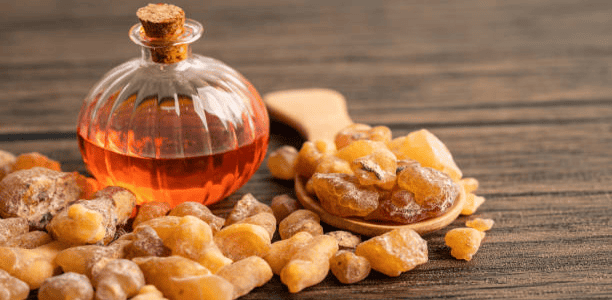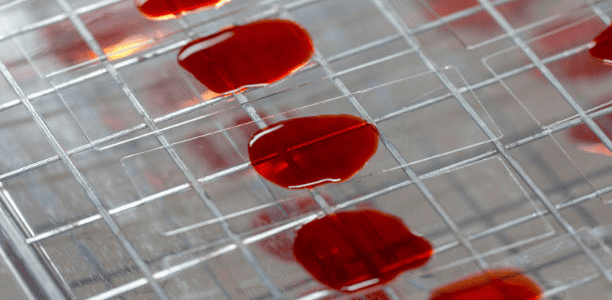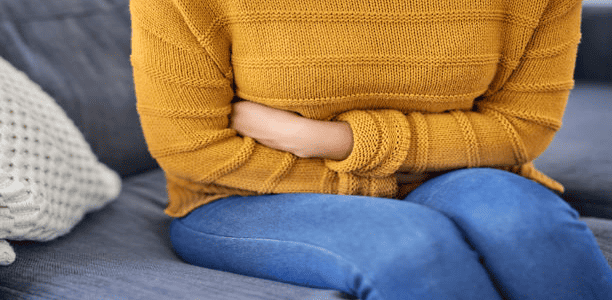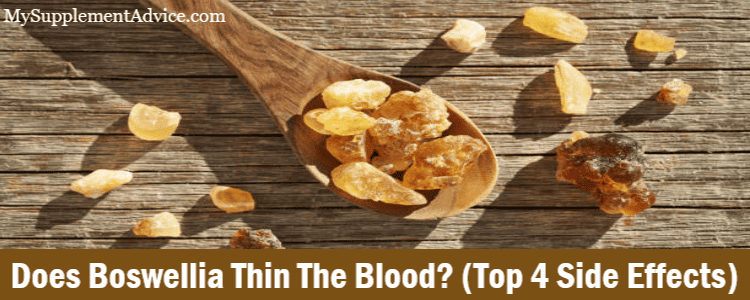
Does Boswellia thin the blood indefinitely?
What are the top side effects it can potentially cause?
Is it safe to incorporate into your everyday routine?
In this article, we're going to answer those questions.
Also – let's find out how to avoid its possible adverse reactions, in order to maxime all of its benefits.
Note: This article includes references and studies on Boswellia and its side effects.
Does Boswellia Thin The Blood? (In A Nutshell)
Firstly – Boswellia is an herb also known as “Indian frankincense”.
It has been used as a traditional medicine because of its notable benefits:
- anti-inflammatory
- anti-cancer
- anti-sun damage
With that being said, it's considered safe in general.
However – just like any herb/plant, it's not free from adverse reactions.
So does it cause blood thinning at all?
Well – there are two possible answers to that:
- No, it doesn't directly thin your blood.
- yes, there's a risk if you take it with anticoagulants (and without your doctor's approval).
So if you have underlying health conditions that require blood thinners, you should be careful.
Their interactions with Boswellia can potentially affect your blood.
With that, it's a must to talk with your doctor if you're in this situation.
Other than that, here are the rest of its possible side effects:
- acid reflux
- stomach discomfort
- allergic reactions
Now – Boswellia has a role in regulating the enzyme that produces prostaglandins.
Although it can help with pain and inflammation, it can also affect the secretion of stomach acid.
So don't take excessive amounts of it (to avoid acid reflux).
Also – the same goes for stomach discomfort, you shouldn't consume Boswellia too much.
BUT the good thing is that you can lower these risk by taking some precautions.
Now, if you're allergic to Boswellia or any herbs from its family, you should definitely avoid it completely.
The best option is to find some alternatives with the same benefits.
Turmeric could be one, as it has a similar effect.
Overall – Boswellia is not considered risky for overall health.
But just be mindful, research about it and consult your doctor before trying it.
Does Boswellia Thin The Blood?
Firstly – there are several concerns about Boswellia's potential to thin the blood.
Here are the reasons why some people perceive it that way [1]:
- the plant's active compound is called boswellic acid
- it's known to have anti-inflammatory activities by inhibiting related enzymes
- also, it plays an essential role in the process of blood clotting
As we all know, platelets play a crucial role in blood clot formation to stop uncontrolled bleeding.
However – blood clotting can be dangerous when there's an excessive gathering of the platelet.
With that, boswellic acid helps to regulate and balance platelet aggregation [2].
That especially when it comes to maintaining proper blood clotting mechanisms.
So it won't be dangerous for people who are at risk.
Now – the blood thinning effect of boswellic acid is rather mild.
However, you can also encounter some problems if you have special health conditions.
To be exact, if you're taking anticoagulant medications, you should be cautious.
There could be some interactions between boswellic acid and those blood-thinners.
Another factor to consider is if you have underlying bleeding disorders.
You should avoid any type of medicines or plants that can exacerbate your health issues.
With that, here are some tips to avoid blood thinning while taking Boswellia:
- For people taking anticoagulants, ask your doctor's consent first.
- Make sure you follow the proper dosage (don't overdose).
- Monitor your blood status to determine if Boswellia works right for you.
- Lastly, check if you have bloody stools/urine, random bruising or bleeding.
Now, if you experience any of the issues above, make sure to check in with your doctor immediately.
Overall – Boswellia doesn't thin the blood in a normal setting.
However, you should still be mindful if you have bleeding disorders or if you're taking anticoagulants.
In that way, you can avoid experiencing any unwanted reactions.
Boswellia & Stomach Discomfort
Stomach cramps are one of the most common side effects of this herb (and many other herbs, let's face it).
Here's how Boswellia can potentially cause stomach discomfort.
To give you an idea, here are the symptoms I'm talking about [3]:
- abdominal cramps/aches
- nausea or urge to vomit
- indigestion (bloating, constipation or gas)
- diarrhea or loose bowel movement
Also – in some very rare cases, bloody stools or urine can appear.
As I mentioned previously, Boswellia has many benefits and it's safe for consumption.
In fact – it has the ability to promote a better digestion and improve IBD [4].
Now – it doesn't typically cause stomach discomfort most of the time.
But there are instances when it can also trigger this side effect.
Firstly, Boswellia can inhibit intestinal motility by contributing to the movement of stomach muscles [5].
So ideally, it should help prevent diarrhea and normalize bowel movement.
But taking higher doses than the recommended ones is not advisable.
The worst thing is that it can excessively reduce motility resulting in constipation.
Again – it's a very rare case, but people with a sensitive stomach should start slowly with this herb.
Of course, we can always avoid stomach discomfort by following some of these tips:
- Start with a low dose and monitor the reaction of your stomach.
- If all is normal, you can gradually increase the dose until your body can tolerate it.
- You may opt to take Boswellia pills after a meal (the benefits are the same).
- Do not overdose and simply follow the recommended dosages from the label.
- You can also choose supplements with a time-release coating (to minimize stomach discomfort).
Lastly – if you have underlying health conditions, it's crucial to consult your doctor first.
Overall, Boswellia's risk to cause stomach pain is pretty low.
But it's definitely better to consume it properly and responsibly.
Boswellia & Acid Reflux
As I mentioned – Boswellia is safe for most people,
But again, we can't deny that it can also cause acid reflux – here are its symptoms [6] :
- gastroesophageal reflux disease (GERD)
- heartburn or burning sensation in the chest
- regurgitation of sour liquid
- pain in the upper abdomen
- trouble swallowing
- lump-like sensation in the throat
Firstly – Boswellia is very similar to non-steroidal anti-inflammatory drugs (NSAIDs) [7].
These medications work to stop COX, which is an enzyme that produces prostaglandins [8].
To give you an idea, prostaglandin causes pain, fever and inflammation during the healing process [9].
At the same time, it also protects the intestinal lining and the stomach by inhibiting acid secretion [10].
So a blockage of this hormone-like compound can lead to acid reflux.
That's because prostaglandin's stomach acid regulating power can become weaker.
Now – acid reflux caused by Boswellia is pretty uncommon.
But when it does appear, there are several risk factors behind.
In order to avoid this side effect, here are some useful tips:
- Take Boswellia in moderation or follow the recommended dosage.
- Eating a meal beforehand can neutralize stomach acid.
- Avoid foods and beverages that can trigger acid reflux (spicy, citrusy, fatty, caffeinated, alcoholic or carbonated).
- Don't lie down immediately after taking Boswellia.
- If you're taking prescription medicines, ask your doctor before.
Lastly – if you're prone to acid reflux, try to manage your stress and weight.
That's because they can contribute to triggering the said condition.
Overall – Boswellia doesn't cause acid reflux right away, it's just one of its potential adverse effects.
But even so, you should take it properly and with precautions.
Boswellia & Allergic Reactions
Lastly – just like any plant, most people will react just perfectly fine to Boswellia.
However, it can also act as an allergen, a major trigger in allergic reactions.
Again – this happens your immune system reacts to inert substances in the environment [11].
This really depends from one person to another.
But here are the symptoms you might be experiencing if you're having an allergic reaction [12]:
- feeling unwell or sick
- tenderness/swollen face, eyes, lips, throat or mouth
- itchiness, rashes or hives
- breathing troubles, coughing or wheezing
- runny nose, sneezing or watery eyes
Now – if your immune system detects Boswellia as an allergen, several things could happen.
But the main one would be the release of antibodies to fight it [13].
That's because your immune system sees it as a threat to your health.
You also need to take note of cross-reactivity in allergic reactions.
It typically occurs if there's a similarity in the protein patterns of some substances [14].
In the case of Boswellia, it belongs to the plant family of Burseraceae.
Some examples of plants under it are myrrh, acacia, pacific almond and other torchwoods.
So if you're already allergic to any of them – there's a significant chance that you're allergic to Boswellia too.
If that's the case, we can't change the fact that Boswellia is one of your allergy triggers.
If this happens, here are the ways to avoid allergic reactions:
- Make sure you know your allergy triggers.
- Only get Boswellia products from trusted companies or providers.
- Start with a low amount/dose and gradually increase it over time (to let your body adapt to it).
- If you are already allergic to tree resins, find other alternatives like turmeric.
- When buying Boswellia products, read the label to check if there are other potential allergens.
With that being said, Boswellia is safe and beneficial in 99.99% of cases.
However – if it happens to be one of your allergens, it's better to stay away from it.
You can always find other alternatives that the same things – like turmeric.
Final Conclusion
To sum it up, Boswellia doesn't directly thin the blood.
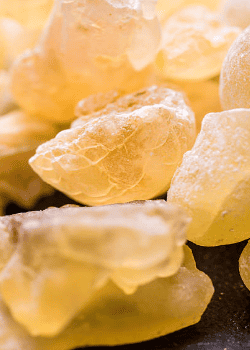
In that way, you can avoid possible interactions that can risk your health.
So if you're unsure, better ask your doctor first before trying Boswellia products.
Besides that, here are the other potential side effects of it:
- stomach discomfort
- acid reflux
- allergic reactions
In general – Boswellia is safe for consumption and applications.
However – you can always find alternatives with the same benefits.
With that, start by knowing your health status before taking Boswellia.
If you have underlying conditions, seek advice from your doctor before introducing it to your routine.
But overall, Boswellia is not dangerous for your health (as long as you take it the right way).
References:
1 – https://www.ncbi.nlm.nih.gov/-pmc/articles/-PMC4611516/
2 – https://www.sciencedirect.com/-science/article/-S037887411100479X/
3 – https://www.healthdirect.gov.au/-abdominal-pain/
4 – https://www.ncbi.nlm.nih.gov/-pmc/articles/-PMC8877038/
5 – https://www.sciencedirect.com/-topics/-boswellia/
6 – https://www.nhs.uk/conditions/-heartburn-and-acid-reflux/
7 – https://www.sciencedirect.com/-topics/sciences/-boswellia/
8 – https://www.sciencedirect.com/-topics/-boswellia-serrata/
9 – https://www.betterhealth.vic.gov.au/non-steroidal-anti-inflammatory-drugs/
10 – https://pubmed.ncbi.nlm.nih.gov/-3040310/
11 – https://www.ncbi.nlm.nih.gov/-books/-NBK545237/
12 – https://www.nhs.uk/conditions/-allergies/
13 – https://www.hopkinsmedicine.org/-health/-allergies-and-the-immune-system/
14 – https://www.aaaai.org/-allergy/-cross-reactivity-defined/

